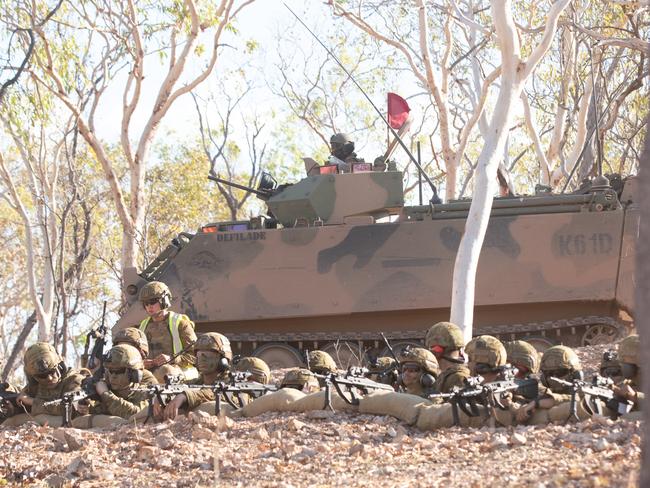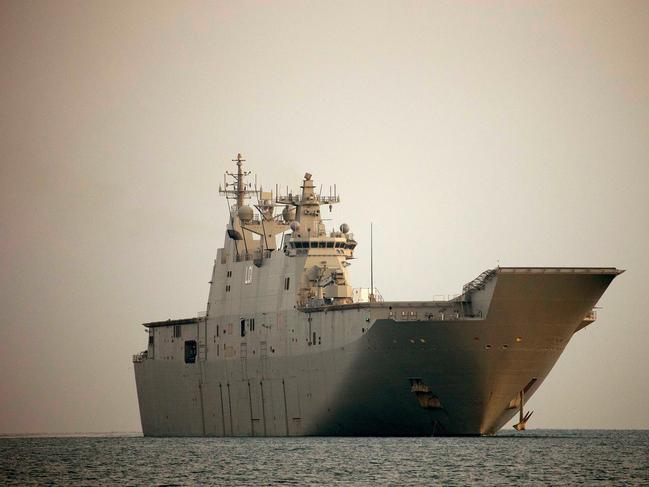NT government legacy on the line as Richard Marles mulls Defence Strategic Review
The Strategic Defence Review is expected to be released publicly by Richard Marles next month, but it has already raised serious questions for the Northern Territory government.
Business
Don't miss out on the headlines from Business. Followed categories will be added to My News.
Next month, Australia’s Defence Minister Richard Marles is expected to hand down a document that will impact the lives and livelihoods of every Territorian.
The Federal Government’s Defence Strategic Review (DSR) is one of the most important analyses in nearly 40 years on how to best defend Australia
We know that our region is becoming ever more strategically important as the US and China continue to face off and we hear the warnings from our national leaders that we live in a more insecure world so we can be optimistic that there will be an increased focus on the North coming out of the DSR.
Territorians have every reason to cross their fingers. It is no exaggeration that Defence is the linchpin of our entire economy right now with some estimates pointing to $1bn being pumped into our economy for defence purposes each year.

To give it some perspective, this is significantly more than is received from any single project on the Territory Government’s Major Project list.
Thousands of local construction contractors, SMEs and tradies are reaping the benefits particularly since Master Builders’ success in persuading Defence that local businesses have the capacity to manage the big defence projects that would otherwise have been awarded to those from interstate.
But as any business person will tell you, risk is the flip side of opportunity and while public commentary about the DSR seems positive, we can’t afford to be complacent.
The expectation is that the DSR will shake up and reset Defence expenditure in order to prioritise and fast track the material and facilities most urgently needed to defend Australia in the geopolitical and military environment that we currently face.
Any major reorganisation is likely to cause disruption and delay, pressure on existing programs and intense competition internally within Defence and from other states and territories for what the Defence Minister has recently highlighted as a limited budget.

Even small delays in the timing of projects will cause hiccups in the pipeline of work. With our thin economy, this will be disproportionately felt by Territory businesses and pose a risk of negatively impacting opportunities, jobs and the viability of businesses.
So, beyond the outcomes of the DSR what we want to know that our government has been acting in our best interests and giving sufficient weight in their priorities to the reality Defence is one of our largest industries and one which could contribute an even higher share of our economy.
Has our government been sufficiently focused on the DSR, engaged with authors, worked to bust erroneous myths about the difficulty delivering projects in the Territory and putting the strongest case forward for the NT?
Have our political leaders been proactive in ensuring that our relationships with key Federal Ministers and backbench influencers in the Defence space are solid and as favourable to the NT as possible?
And crucially, has our government, and importantly, their most senior bureaucrats, been hard at work developing a really solid and sophisticated plan to powerfully position and influence the decisions of the Federal Government and Defence after the DSR is handed down?
The answers to these questions will be central to the legacy of this government. Perhaps uncomfortably for some, it is the strength of the economy that they leave behind, or lack of it, that they will be most remembered for.

The government’s target to grow the economy to $40bn by 2030 plan is also inextricably bound up in their plan to respond to the DSR.
In its submission to the Federal Inquiry into workforce development in the North the government is open about the risk that a severe lack of workers, negligible population growth, the increasing need for improved liveability and a woefully insufficient supply of new and shovel ready affordable land for new housing poses to its ambitious target for economic growth.
Tackling these challenges will also be vital to ensuring that the Territory is positioned to take advantage of the next phase, beyond the construction of new defence facilities and the sharpening of existing ones.
Does our government have the vision and capability to grow the Territory into a defence hub supporting industry capable of sustaining key assets in the Defence of our country?
We have to hope so.




